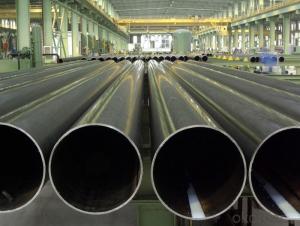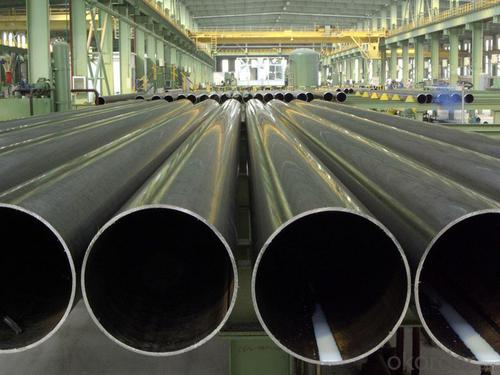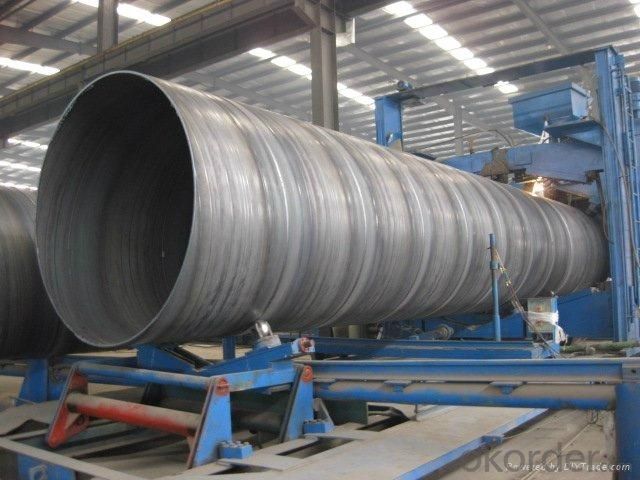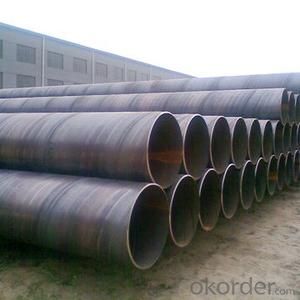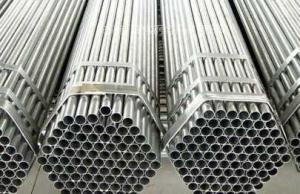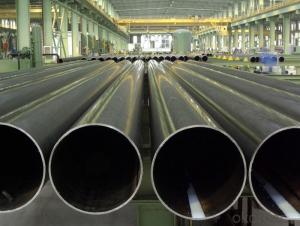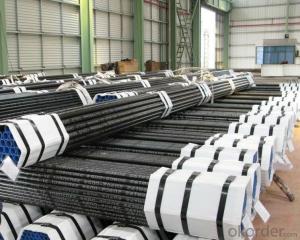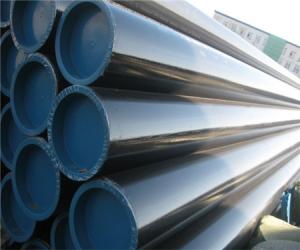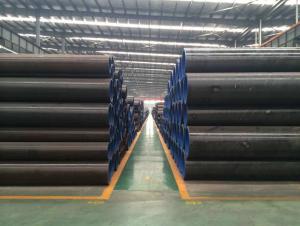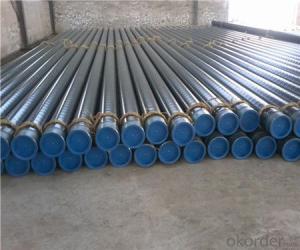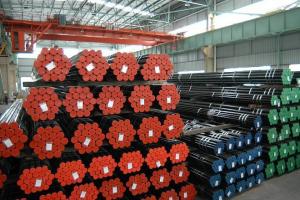Spiral Submerged Arc Welded Steel Pipe API 5L
- Loading Port:
- Tianjin
- Payment Terms:
- TT OR LC
- Min Order Qty:
- 25 m.t.
- Supply Capability:
- 10000 m.t./month
OKorder Service Pledge
OKorder Financial Service
You Might Also Like
1、Structure of Spiral Submerged Arc Welded Steel Pipe API 5L:
To be used for conveying gas, water, and petroleum for oil and natural gas industries.
2、Main Features of the Spiral Submerged Arc Welded Steel Pipe API 5L:
• High manufacturing accuracy
• High strength
• Small inertia resistance
• Strong heat dissipation ability
• Good visual effect
• Reasonable price
3、Spiral Submerged Arc Welded Steel Pipe API 5L Specification:
Standard | GB, DIN, ASTM ASTM A106-2006, ASTM A53-2007 |
Grade | 10#-45#, 16Mn 10#, 20#, 45#, 16Mn |
Thickness | 8 - 33 mm |
Section Shape | Round |
Outer Diameter | 133 - 219 mm |
Place of Origin | Shandong, China (Mainland) |
Secondary Or Not | Non-secondary |
Application | Hydraulic Pipe |
Technique | Cold Drawn |
Certification | API |
Surface Treatment | factory state or painted black |
Special Pipe | API Pipe |
Alloy Or Not | Non-alloy |
Length | 5-12M |
Outer Diameter | 21.3-610mm |
Grade | 20#, 45#, Q345, API J55, API K55, API L80, API N80, API P110, A53B |
Standard | ASME, ASTM |
1) Material:20#(ASTM A 106/A53 GRB.API5LGRB,GB),45#,16Mn,10#.
2) Specification range:OD:21.3-610mm,WT:6-70mm,length:6-12m or according to the requirement of clients.
3) Excutive standards:GB,ASME API5L.ASTM A 106/A53,Despite of the above standards,we can also supply seamless steel pipe with standard of DIN,JIS,and so on,and also develop new products according to the requirements of our clients!
4) Surface:black lacquered,varnish coating or galvanized.
5) Ends:Beveled or square cut,plastic capped,painted.
6) Packing:bundles wrapped with strong steel strip,seaworthy packing.
4、Packaging & Delivery
Packaging Details: | seaworthy package,bundles wrapped with strong steel strip |
Delivery Detail: | 15-30days after received 30%TT |
5、FAQ of Spiral Submerged Arc Welded Steel Pipe API 5L:
①How is the quality of your products?
Our products are manufactured strictly according to national and internaional standard, and we take a test
on every pipe before delivered out. If you want see our quality certifications and all kinds of testing report, please just ask us for it.
Guaranteed: If products’ quality don’t accord to discription as we give or the promise before you place order, we promise 100% refund.
②How about price?
Yes, we are factory and be able to give you lowest price below market one, and we have a policy that “ for saving time and absolutely honest business attitude, we quote as lowest as possible for any customer, and discount can be given according to quantity”,if you like bargain and factory price is not low enough as you think, just don’t waste your time.Please trust the quotation we would give you, it is professional one.
③Why should you chose us?
Chose happens because of quality, then price, We can give you both.Additionally, we can also offer professional products inquiry, products knowledge train(for agents), smooth goods delivery, exellent customer solution proposals.Our service formula: good quality+good price+good service=customer’s trust
SGS test is available, customer inspection before shipping is welcome, third party inspection is no problem
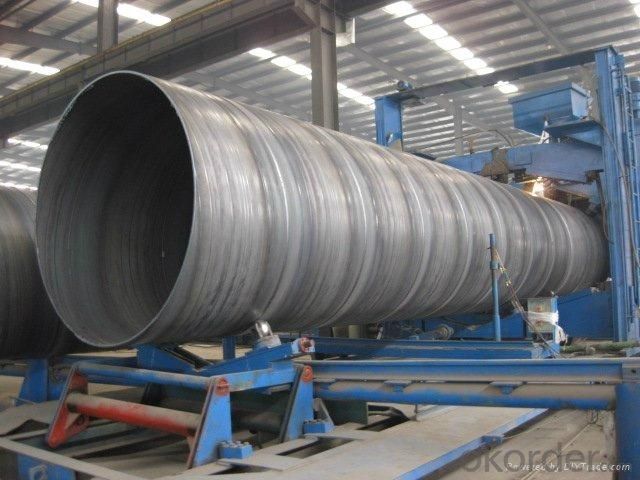
- Q: What is the maximum allowable deflection for steel pipes?
- Industry standards and design codes typically determine the maximum allowable deflection for steel pipes. These regulations specify the acceptable limits of deflection to guarantee the pipes' structural integrity and functionality. The maximum allowable deflection can vary, depending on factors like pipe diameter, wall thickness, material properties, and the application type. To determine the specific maximum allowable deflection for a particular steel pipe application, it is crucial to reference relevant standards and codes such as the ASME B31.3 code for process piping or AWWA standards for water transmission and distribution pipes. Adhering to these guidelines ensures the safe and efficient operation of steel pipes in various industries and applications.
- Q: What is the diameter of the steel tube DN20?
- Pipe installation without conversion, because in the same standard in the same diameter connecting dimensions of the same nominal pressure level of the same, and the same material have the same diameter, the nominal diameter of the purpose is to facilitate connectivity
- Q: What are the different types of steel pipe hangers?
- In various industries and applications, steel pipe hangers are widely used to support and secure pipes, ensuring proper alignment and preventing sagging or movement. Let's explore some of the different types of hangers available: 1. Clevis Hangers: These hangers consist of a U-shaped metal bracket called a clevis, which is connected to the supporting structure using a threaded rod. Clevis hangers allow for vertical adjustment and are commonly used in suspended piping systems. 2. Split Ring Hangers: Circular metal rings that are split on one side, split ring hangers can be easily opened and closed around the pipe to provide a secure hold. They are often used for suspending horizontal pipes. 3. Beam Clamps: Beam clamps are designed to attach to structural beams or channels, offering a secure mounting point for pipe hangers. They come in various designs, such as top flange, bottom flange, and side mount, to accommodate different installation needs. 4. Swivel Hangers: Used for supporting pipes that undergo thermal expansion or contraction, swivel hangers allow horizontal movement while still providing support and preventing excessive stress on connections. 5. Riser Clamps: Riser clamps are used to support vertical pipes or risers. Typically consisting of a metal band that wraps around the pipe and a threaded rod connecting it to the supporting structure. 6. Pipe Roller Supports: Pipe roller supports are utilized when pipes need to move horizontally due to expansion or contraction. These hangers consist of a series of rollers that allow the pipe to move freely while still providing support. 7. Pipe Saddles: Pipe saddles are U-shaped brackets that wrap around the pipe, providing support on both sides. They are often used to secure pipes to walls or other structures. These examples showcase the variety of steel pipe hangers available. Selecting the appropriate hanger for each application is crucial, taking into account factors such as pipe size, weight, location, and required movement allowance. This ensures proper support and functionality of the piping system.
- Q: What are the main aspects of precision steel tubes?
- Precision tube is a kind of seamless steel tube with high precision and high brightness produced by cold drawing or cold rolling.
- Q: How do steel pipes compare to other pipe materials like PVC or copper?
- Steel pipes have several advantages over other pipe materials like PVC or copper. Firstly, steel pipes are incredibly strong and durable, making them suitable for high-pressure applications and long-term use. They have a higher resistance to cracking or breaking, which is especially beneficial in demanding environments. Secondly, steel pipes have excellent heat resistance, making them ideal for transporting hot fluids. On the other hand, PVC pipes are more lightweight, cost-effective, and easy to install, making them suitable for non-pressure applications. Copper pipes are known for their corrosion resistance and ability to handle high temperatures, but they are typically more expensive. Overall, the choice between steel, PVC, or copper pipes depends on the specific requirements of the application, considering factors like pressure, temperature, cost, and ease of installation.
- Q: How do you repair a damaged steel pipe?
- To repair a damaged steel pipe, the first step is to identify the extent of the damage. If the damage is minor, it can be fixed using a pipe repair clamp or a stainless-steel wrap. For larger damages, a cut and replace method may be necessary, where the damaged section is cut out and replaced with a new piece of pipe. In some cases, welding or soldering techniques may be required. It is important to consult with a professional plumber or pipe repair specialist to ensure the correct repair method is used for the specific situation.
- Q: What is the difference between steel pipe and polyethylene pipe?
- Steel pipe and polyethylene pipe are two different types of materials used for plumbing and construction purposes. The main difference between these two pipes lies in their composition and characteristics. Steel pipe is made from a combination of iron and carbon, which gives it its strength and durability. It is commonly used in applications where high pressure and heavy loads are expected, such as in industrial settings or for underground gas and oil pipelines. Steel pipe is known for its resistance to corrosion and its ability to withstand extreme temperatures. On the other hand, polyethylene pipe is a type of plastic pipe made from high-density polyethylene (HDPE) or low-density polyethylene (LDPE). It is lightweight, flexible, and easy to install, making it a popular choice for residential plumbing and irrigation systems. Polyethylene pipe is resistant to chemicals, UV rays, and abrasive materials, making it suitable for both above-ground and underground installations. Another significant difference between steel pipe and polyethylene pipe is their cost. Steel pipe generally tends to be more expensive due to the raw materials and manufacturing processes involved. Polyethylene pipe, on the other hand, is relatively affordable and cost-effective, especially for smaller-scale projects. In terms of maintenance, steel pipe requires periodic inspections and maintenance to prevent corrosion and ensure its longevity. Polyethylene pipe, on the other hand, is virtually maintenance-free due to its resistance to corrosion and chemical degradation. In summary, the main difference between steel pipe and polyethylene pipe lies in their composition, strength, durability, cost, and maintenance requirements. The choice between these two pipes depends on the specific needs of the project, taking into consideration factors such as pressure, load, budget, and environmental conditions.
- Q: How are steel pipes made?
- Steel pipes are made through a process called pipe manufacturing, which involves several steps. First, raw materials such as iron ore, coal, and limestone are melted in a blast furnace to produce molten iron. The molten iron is then mixed with recycled steel and processed in a basic oxygen furnace or electric arc furnace to refine its composition and remove impurities. Once the desired steel grade is achieved, it is cast into billets, which are heated and pierced to form a hollow cylindrical shape. These pierced billets are then elongated and shaped into pipes through a process called hot rolling or cold drawing. Finally, the pipes undergo various finishing operations, such as straightening, cutting, and inspection, before being ready for use in various applications.
- Q: What are the different methods of insulating steel pipes?
- There exists a variety of methods for insulating steel pipes, depending on the specific needs and requirements of the application. Some commonly utilized methods include: 1. Insulation wraps: By enveloping the steel pipes with insulating materials such as fiberglass, mineral wool, or foam insulation and securing them tightly with adhesive or tape, insulation wraps offer a cost-effective and straightforward installation option favored by many. 2. Insulation coatings: Applying a layer of insulating material directly onto the surface of the steel pipe, insulation coatings made from materials like epoxy, polyurethane, or polyethylene protect against corrosion and temperature fluctuations, making them ideal for harsh environments. 3. Insulation jackets: Utilizing pre-fabricated insulation jackets designed to fit over the steel pipes, this method combines insulation materials with a weatherproof outer layer. Insulation jackets are commonly employed for outdoor or exposed pipelines, providing excellent insulation and protection against external elements. 4. Insulation foam: Injecting foam insulation into the space between the steel pipe and an outer casing, the foam expands and hardens to create a sealed and well-insulated layer. Apart from preventing heat loss or gain, foam insulation also offers remarkable soundproofing properties. 5. Insulation tapes: Specially designed insulation tapes made from PVC or rubber, possessing good insulating properties, are wrapped around smaller pipes or joints. This flexible and easy-to-apply solution is commonly employed. When selecting the appropriate method to insulate steel pipes, it is crucial to consider factors such as operating temperature, environmental conditions, and specific application requirements. Seeking advice from a professional or insulation specialist can assist in determining the most suitable insulation method for individual needs.
- Q: What is the difference between steel pipe and PVC conduit?
- Steel pipe and PVC conduit serve distinct purposes and possess unique characteristics. The material composition stands as a primary distinction between steel pipe and PVC conduit. Steel pipe consists of robust and enduring materials, typically carbon steel or stainless steel, rendering it sturdy and resistant to impact. Consequently, it finds its utility in heavy-duty applications such as plumbing or structural support. In contrast, PVC conduit is constructed from polyvinyl chloride, a type of plastic. PVC's lightweight, flexibility, and ease of manipulation make it ideal for electrical purposes like safeguarding and directing electrical wires. Resistance to corrosion represents another disparity between the two. Steel pipe exhibits greater resistance to corrosion than PVC conduit, particularly when fortified with protective layers like zinc or epoxy. This makes steel pipe suitable for outdoor applications, subterranean installations, or environments with high moisture or corrosive elements. PVC conduit, while generally resistant to moisture and chemicals, may deteriorate over time when exposed to sunlight and can be harmed by specific chemicals. Consideration of cost becomes another factor. Steel pipe generally incurs greater expenses than PVC conduit due to its material and manufacturing process. Nonetheless, steel pipe's durability and extended lifespan establish it as a cost-effective selection in the long run, particularly for applications necessitating high strength and longevity. On the contrary, PVC conduit is comparatively inexpensive and readily accessible, rendering it a more affordable choice for numerous electrical projects. Lastly, installation methods differ between the two. Steel pipe is typically connected through threaded connections or welded joints, mandating specialized tools and skills. Conversely, PVC conduit can be effortlessly cut, assembled, and connected using PVC cement or fittings. This renders PVC conduit a more DIY-friendly option for electrical installations. In summary, steel pipe and PVC conduit diverge in terms of material composition, resistance to corrosion, cost, and installation methods. Steel pipe boasts strength, durability, and corrosion resistance, making it suitable for rigorous applications. PVC conduit, conversely, possesses lightness, flexibility, and affordability, rendering it ideal for electrical projects.
Send your message to us
Spiral Submerged Arc Welded Steel Pipe API 5L
- Loading Port:
- Tianjin
- Payment Terms:
- TT OR LC
- Min Order Qty:
- 25 m.t.
- Supply Capability:
- 10000 m.t./month
OKorder Service Pledge
OKorder Financial Service
Similar products
Hot products
Hot Searches
Related keywords
